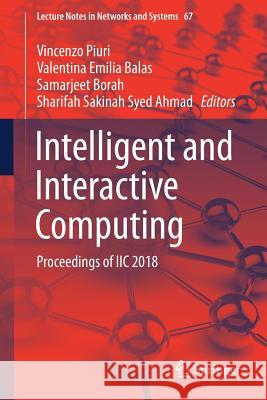Intelligent and Interactive Computing: Proceedings of IIc 2018 » książka



Intelligent and Interactive Computing: Proceedings of IIc 2018
ISBN-13: 9789811360305 / Angielski / Miękka / 2019 / 569 str.
Intelligent and Interactive Computing: Proceedings of IIc 2018
ISBN-13: 9789811360305 / Angielski / Miękka / 2019 / 569 str.
(netto: 575,06 VAT: 5%)
Najniższa cena z 30 dni: 578,30
ok. 16-18 dni roboczych.
Darmowa dostawa!
A Proposed Framework: Enhanced Automated Duplication Algorithm for Flash Application.- Publication Model for Academic Talent Based On Apriori Technique.- Software Module Clustering based on the Fuzzy Adaptive Teaching Learning based Optimization Algorithm.- Dynamic Solution Probability Acceptance within the Flower Pollination Algorithm for t-way Test Suite Generation.- A Study on Gamification for Higher Education Students' Engagement Towards Education 4.0.- An Investigation of Learner Characteristics that Use Massive Open Online Courses (MOOC) in Learning Second Language.- Improved Ozone Pollution Prediction using Extreme Learning Machine with Tribas Regularization Activation Function.- Cultural Metadata Enhancement by Using Community-driven Approach to Create Digital Holistic Culture Conservation System.- Tracking Coastal Change over Kuala Terengganu using Landsat.- A Design of Automated Surgical Illumination System.- Image Spam Detection on Instagram using Convolutional Neural Network.- A Review of Botnet Detection Approaches Based on DNS Traffic Analysis.- Face Recognition using Texture Features and Multi-Layer Perceptron.- Classification of Landsat 8 Satellite Data Using Unsupervised Methods.
Vincenzo Piuri is a Professor at the University of Milan, Italy (since 2000). He was an Associate Professor at Politecnico di Milano, Italy, a Visiting Professor at the University of Texas at Austin, USA, and a Visiting Researcher at George Mason University, USA. He has founded a start-up company in the area of intelligent systems for industrial applications and is active in industrial research projects. He received his M.S. and Ph.D. in Computer Engineering from Politecnico di Milano, Italy. His main research and industrial application interests are: artificial intelligence, intelligent systems, computational intelligence, pattern analysis and recognition, machine learning, signal and image processing, biometrics, intelligent measurement systems, industrial applications, distributed processing systems, Internet-of-Things, cloud computing, fault tolerance, application-specific digital processing architectures, and arithmetic architectures. He published over 400 papers in international journals, international conference proceedings, and books. He is Fellow of the IEEE and Distinguished Scientist of ACM. He has been IEEE Vice President for Technical Activities (2015), member of the IEEE Board of Directors (2010-2012, 2015), and President of the IEEE Computational Intelligence Society (2006-2007). He is Editor-in-Chief of the IEEE Systems Journal (2013-2019).
Valentina Emilia Balas is currently a Full Professor at the Department of Automatics and Applied Software at the Faculty of Engineering, “Aurel Vlaicu” University of Arad, Romania. She holds a Ph.D. in Applied Electronics and Telecommunications from the Polytechnic University of Timisoara. Dr. Balas is the author of more than 250 research papers in refereed journals and international conferences. Her research interests are in intelligent systems, fuzzy control, soft computing, smart sensors, information fusion, modeling and simulation. She is the Editor-in-Chief of the International Journal of Advanced Intelligence Paradigms (IJAIP) and the International Journal of Computational Systems Engineering (IJCSysE), a member of the editorial board of several national and international journals and is the Director of the Intelligent Systems Research Centre at Aurel Vlaicu University of Arad. She is a member of EUSFLAT, SIAM, a senior member of IEEE, and a member of TC – Fuzzy Systems (IEEE CIS), TC – Emergent Technologies (IEEE CIS), and TC – Soft Computing (IEEE SMCS).
Samarjeet Borah is currently working as Professor in the Department of Computer Applications, Sikkim Manipal University (SMU), Sikkim, India. Dr. Borah handles various academics, research and administrative activities. He is also involved in curriculum development activities, board of studies, doctoral research committee, IT infrastructure management etc. along with various administrative activities under SMU. Dr. Borah is involved with various funded projects in the capacity of Principal Investigator/Co-principal Investigator. The projects are sponsored by agencies like AICTE (Govt. of India), DST-CSRI (Govt. of India), Dr. TMA Pai Endowment Fund etc. He is associated with IEEE, ACM (CSTA), IAENG and IACSIT. Dr. Borah organized various national and international conferences in SMU. Some of these events include ISRO Sponsored Training Programme on Remote Sensing & GIS, NCWBCB 2014, NER-WNLP 2014, IC3-2016, ICACCP 2017, IC3-2018 etc. Dr. Borah is involved with various book volumes and journals of repute in the capacity of Editor/Guest Editor such as IJSE, IJHISI, IJGHPC, IJIM, IJVCSN, JISys, IJIPT, IJDS etc.
Sharifah Sakinah Syed Ahmad, is currently an Associate Professor in the Department, Intelligent Computing & Analytics (ICA), Faculty of Information & Communication Technology, Universiti Teknikal Malaysia Melaka (UTeM). She received her Bachelors and Masters degrees of Applied Mathematics in School of Mathematics from University Science Malaysia. Following this, she received her Ph.D. from the University Of Alberta, Canada in 2012 in Intelligent System. Her research in graduate school focused on granular computing and fuzzy modeling. Her current research work is on the granular fuzzy rule-based system, Evolutionary Method, Modeling and Data Science. Sakinah has been a member of numerous program committees of National and International conferences in the area of Intelligent system and soft computing. Sharifah Sakinah is intensively involved in organizing and reviewing activities. She is a member of IEEE Systems, Man, and Cybernetics and Association for Computing Machinery (ACM). Sharifah Sakinah has co-authored numerous journal publications, conference articles and book chapters on the topics above. She also has received several grants from various funding agencies including the Ministry Of Education Malaysia, and the Ministry of Science, Technology, and Innovation Malaysia.
This book presents the latest research on computational approaches to learning. It includes high-quality peer-reviewed papers from the “Intelligent and Interactive Computing Conference (IIC 2018)” organized by the Universiti Teknikal Malaysia, Melaka. It uses empirical studies, theoretical analysis, and comparisons with psychological phenomena to show how learning methods can be employed to solve important application problems. The book also describes ongoing research in various research labs, universities and institutions, which may lead to the development of marketable products.
1997-2026 DolnySlask.com Agencja Internetowa
KrainaKsiazek.PL - Księgarnia Internetowa









